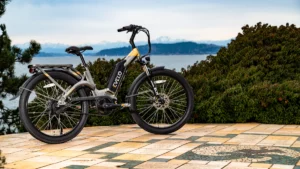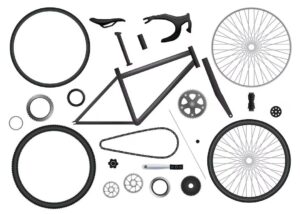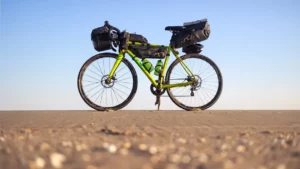自転車のハンドルバー, 自転車部品の重要な部品として, サイクリング体験の全体的な機能性と快適さにおいて重要な役割を果たします。. この包括的なガイドでは、, 私たちは飛び込みます 8 自転車のさまざまな種類のハンドルバー 利用可能. スピードを求めるロードサイクリストでも, 冒険を渇望するマウンテンバイカー, または快適さを求めるレジャーライダー, あなた専用に設計された自転車ハンドルバーのタイプがあります.
8 自転車のハンドルバーの種類
がある 8 自転車で利用できる一般的なタイプのハンドルバー, 含む:
- ドロップバー: ロードサイクリングに最適, これらのバーは空力的な位置決めを提供します, 電力伝達, およびコントロール.
- フラットバー: マウンテンバイクやレジャーライドに最適, 直立したライディングポジションを提供し、操作性を向上させます。.
- ライザーバー: オフロードやトレイルライド向けに設計, これらのバーはより快適で直立した姿勢を提供します.
- 拡声器バー: アーバンサイクリングで人気, スタイリッシュなデザインと多彩なグリップ位置を備えています。.
- エアロバー: タイムトライアルやトライアスロン向けに特別に設計, これらのバーは空力的な位置で速度と効率を向上させます。.
- バタフライバー: ツーリングや長距離ライドに最適, 快適のために複数の手の位置を提供します.
- ヒゲバー: これらのバーは幅広い手の位置で多用途性を提供し、さまざまなライディングスタイルに適しています。.
- クルーザーバー: カジュアルでのんびりとしたライドに最適, リラックスした快適なライディングポジションを提供します.
ドロップバー

ドロップバーはロードサイクリング愛好家にとって古典的な選択肢です. と 湾曲したデザイン を促進する 空力姿勢, ドロップバーには多くの利点があります. これらには、電力伝達の改善が含まれます, 速度の増加, 強化された制御. From traditional drop bars to compact and ergonomic variations, there’s a type of handle bar that suits every rider’s preference.
フラットバー

Ideal for mountain biking and leisure rides, flat bars offer a more upright riding position, ensuring better control and maneuverability on rough terrains. The simplicity of their design makes them highly versatile and suitable for riders of all skill levels. Explore variations such as riser flat bars or wide flat bars to find your optimal style.
ライザーバー

If off-road and trail riding is your passion, riser bars are the perfect choice. These handlebars feature a higher rise, providing a more upright and comfortable riding posture. Riser bars excel in absorbing shocks and vibrations, 困難な地形でもスムーズで楽しい走行を保証します. さまざまなバリエーション, プルバックライザーバーを含む, 希望のライディングポジションを実現するためのさらなるカスタマイズが可能.
拡声器バー

都市部や都市部のサイクリストに人気, 拡声器バーは洗練されたスタイリッシュなデザインを提供します. 拡声器のような独特の形状で、, これらのハンドルバーは複数のグリップ位置を提供します, さまざまなライディングの好みに対応. よりアグレッシブなライドのために前方ポジションを好むか、カジュアルなサイクリングのためにリラックスしたグリップを好むか。, 拡声器バーは多用途性とモダンな美学を提供します.
エアロバー

タイムトライアルやトライアスロン用に設計, エアロバーにより、サイクリストは空力的なポジショニングを実現できます, 抵抗を最小限に抑え、速度を最大限に高める. こちらのハンドルバータイプ 激しい運動中に安定性とサポートを提供する拡張アームレストを備えています。. 一秒一秒を追いかける競争力のあるサイクリスト向け, エアロバーは風の抵抗を軽減し、効率を高めるという点でゲームチェンジャーです.
バタフライバー

ツーリングや長距離ライドに, バタフライバーが人気です, それで . 独自のデザインにより複数の手の位置を提供, サイクリストが長時間の移動中に疲労を軽減し、快適さを維持できるようにします。. さまざまなグリップオプションを搭載, トップスも含めて, フード, そしてドロップします, バタフライバーはライダーに最適化された長距離移動のための比類のない多用途性を提供します.
ヒゲバー

ヒゲバーは独特の外観と幅広い手の位置を提供します. 口ひげのような緩やかな曲線で, これらのハンドルバーは快適で人間工学に基づいたライディング体験を提供します. 口ひげバーは多用途性を求めるライダーに適しています, 様々なグリップに対応できるので、, レジャーライディングや長距離ツーリングにも適しています。.
クルーザーバー

リラックスして快適なライディングポジションをお好みの場合, クルーザーバーが完璧にマッチします. これらの幅広で湾曲したハンドルバーは直立姿勢を促進します, カジュアルでのんびりとしたライドに最適です。. クルーザーバーが安定性を向上, コントロール, そして全体的な快適さ, 景色を楽しみながら、のんびりサイクリングを楽しめます.
ハンドルバーを選択する際に考慮すべき要素
あなたの自転車に適したハンドルバーを選ぶときは, いくつかの重要な要素を考慮する必要があります.
快適さと人間工学
何よりもまず, ライディング中の快適さを優先する. ハンドルバーは快適なグリップを提供し、手首への負担を最小限に抑える必要があります。, 手, そして上半身. 考慮する 人間工学に基づいたデザインのハンドルバー, 輪郭のある形状やクッション性のあるグリップなど, ロングライド時の快適性を高めるために.
バイクのフィット感と互換性
選択したハンドルバーが次のものであることを確認してください。 あなたのバイクの仕様と互換性があります. ステム径などの要因, クランプサイズ, ハンドルバーの幅は自転車のフレームとフォークと一致する必要があります. バイクに適切にフィットすると、ライディング姿勢が最適化されます。, 怪我のリスクを減らす, 全体的なパフォーマンスを向上させます. 互換性がわからない場合, プロのバイクフィッターに相談するか、メーカーのガイドラインを参照してください.
ライディングスタイルと地形
選択したハンドルバーは、特定のライディング スタイルと、通常遭遇する地形に合わせて選択する必要があります。. 例えば, 主に公道を走行し、スピードを求める場合, 空力ドロップバーは理想的な選択です. 一方で, 頻繁にオフロードトレイルに挑戦する場合, より良いコントロールと安定性を得るために、幅広のグリップとより直立した位置のハンドルバーを検討してください。. ハンドルバーをライディングスタイルや地形に合わせると、全体的なライディングエクスペリエンスが向上します。.
個人的な好みと経験
ハンドルバーの選択は個人の好みの問題になる可能性があります. などの要因 の種類 ハンドルバーグリップ, バーの形状, そして全体的な美しさ ライダーによって異なる場合があります. 自分自身の好みや、特定のニーズや制限があるかどうかを考慮することが重要です. さらに, サイクリストとしての経験レベルを考慮する. 初心者はより安定性と使いやすさを提供するハンドルバーを好むかもしれません, 一方、経験豊富なライダーは、自分の特定のスタイルに合わせて、より特化したハンドルバーを選択する場合があります。.
信頼できる地元のショップまたはメーカーを選択してください
最高レベルの品質とパフォーマンスを確保するために, することをお勧めします ハンドルバーは地元の信頼できる自転車店または評判の良い自転車店から購入してください。 自転車部品メーカー. これらの施設には、お客様の特定のニーズに基づいてガイダンスを提供し、情報に基づいた意思決定を支援できる知識豊富なスタッフがいます。. 適切な設置と調整のサポートも提供できます。, 最適なパフォーマンスと安全性を確保するために、ハンドルバーが正しく設定されていることを確認します。.
ハンドルバーをテストする方法?

最適なハンドルバーのタイプを見つけるには, それらをテストすることが不可欠です. 試乗を通じてさまざまなハンドルバーを試す機会を提供する地元の自転車店を訪れてください。. もし可能なら, その利点を最大限に体験するには、さまざまなタイプのハンドルバーをレンタルまたは借りることを検討してください。. さらに, 経験豊富なサイクリストやオンライン コミュニティからアドバイスを求め、洞察や推奨事項を得る.
結論
結論は, 自転車のハンドルバーは単なる機能部品ではありません. 快適さを決定する上で重要な役割を果たします, コントロール, そしてライディングスタイル. ハンドルバーの種類ごとの特徴と利点を理解することで、, 情報に基づいた決定を下すことができ、サイクリングの冒険をさらに充実させることができます. 覚えて, 完璧なハンドルバーとは、あなたの個々のニーズや好みに応えるものです。, バイクでの無限の楽しみを保証します.
自転車ハンドルバーに関するよくある質問
- 自転車のハンドルバーはユニバーサルですか?
いいえ, 自転車のハンドルバーは万能ではありません. さまざまな形があります, サイズ, さまざまなライディング分野や好みに対応するスタイル. バイクの仕様とライディングスタイルに適合したハンドルバーを選択することが重要です.
- ハンドルバーグリップの外し方?
ハンドルバーグリップを取り外すには, 次の手順に従ってください:
a. まずはグリップの下に少量の消毒用アルコールまたは石鹸水をスプレーしてグリップを緩めます。.
b. マイナスドライバーまたは同様のツールを使用して、ハンドルバーからグリップを慎重にこじって取り外します。. グリップが緩むまでゆっくりと回してください。.
c. グリップが緩んだら, ハンドルバーからスライドさせることができます.
- マウンテンバイクのハンドルバーが広いのはなぜですか?
マウンテンバイクは安定性を高めるために幅広のハンドルバーを備えています, コントロール, 荒れた地形やテクニカルな地形でも活用できます. 幅広のハンドルバーによりハンドリングと操作性が向上, ライダーが困難な障害物やトレイルを通過する際に、バイクをより適切に制御できるようになります。.

















